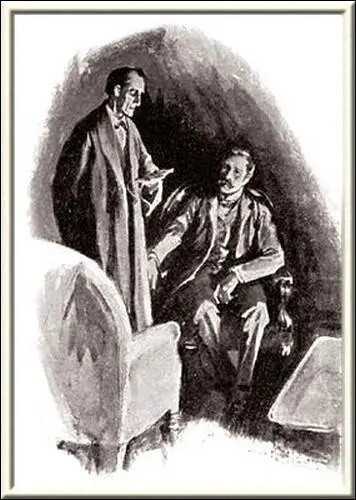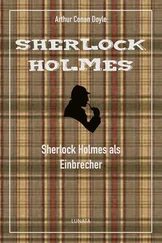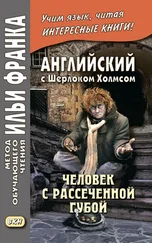"It only remains to indicate the part which she had played throughout. There can be no doubt that Stapleton exercised an influence over her which may have been love or may have been fear, or very possibly both, since they are by no means incompatible emotions. It was, at least, absolutely effective. At his command she consented to pass as his sister, though he found the limits of his power over her when he endeavoured to make her the direct accessory to murder. She was ready to warn Sir Henry so far as she could without implicating her husband, and again and again she tried to do so. Stapleton himself seems to have been capable of jealousy, and when he saw the baronet paying court to the lady, even though it was part of his own plan, still he could not help interrupting with a passionate outburst which revealed the fiery soul which his self-contained manner so cleverly concealed. By encouraging the intimacy he made it certain that Sir Henry would frequently come to Merripit House and that he would sooner or later get the opportunity which he desired. On the day of the crisis, however, his wife turned suddenly against him. She had learned something of the death of the convict, and she knew that the hound was being kept in the out-house on the evening that Sir Henry was coming to dinner. She taxed her husband with his intended crime, and a furious scene followed, in which he showed her for the first time that she had a rival in his love. Her fidelity turned in an instant to bitter hatred and he saw that she would betray him. He tied her up, therefore, that she might have no chance of warning Sir Henry, and he hoped, no doubt, that when the whole countryside put down the baronet's death to the curse of his family, as they certainly would do, he could win his wife back to accept an accomplished fact and to keep silent upon what she knew. In this I fancy that in any case he made a miscalculation, and that, if we had not been there, his doom would none the less have been sealed. A woman of Spanish blood does not condone such an injury so lightly. And now, my dear Watson, without referring to my notes, I cannot give you a more detailed account of this curious case. I do not know that anything essential has been left unexplained."
"He could not hope to frighten Sir Henry to death as he had done the old uncle with his bogie hound."
"The beast was savage and half-starved. If its appearance did not frighten its victim to death, at least it would paralyse the resistance which might be offered."
"No doubt. There only remains one difficulty. If Stapleton came into the succession, how could he explain the fact that he, the heir, had been living unannounced under another name so close to the property? How could he claim it without causing suspicion and inquiry?"
"It is a formidable difficulty, and I fear that you ask too much when you expect me to solve it. The past and the present are within the field of my inquiry, but what a man may do in the future is a hard question to answer. Mrs. Stapleton has heard her husband discuss the problem on several occasions. There were three possible courses. He might claim the property from South America, establish his identity before the British authorities there and so obtain the fortune without ever coming to England at all; or he might adopt an elaborate disguise during the short time that he need be in London; or, again, he might furnish an accomplice with the proofs and papers, putting him in as heir, and retaining a claim upon some proportion of his income. We cannot doubt from what we know of him that he would have found some way out of the difficulty. And now, my dear Watson, we have had some weeks of severe work, and for one evening, I think, we may turn our thoughts into more pleasant channels. I have a box for 'Les Huguenots.' Have you heard the De Reszkes? Might I trouble you then to be ready in half an hour, and we can stop at Marcini's for a little dinner on the way?"

THE END
Table of Contents
Table of Contents
Part 1. The Tragedy of Birlstone
Chapter 1. The Warning
Chapter 2. Sherlock Holmes Discourses
Chapter 3. The Tragedy of Birlstone
Chapter 4. Darkness
Chapter 5. The People of the Drama
Chapter 6. A Dawning Light
Chapter 7. The Solution
Part 2. The Scowrers
Chapter 1. The Man
Chapter 2. The Bodymaster
Chapter 3. Lodge 341, Vermissa
Chapter 4. The Valley of Fear
Chapter 5. The Darkest Hour
Chapter 6. Danger
Chapter 7. The Trapping of Birdy Edwards
Epilogue
Part 1.
The Tragedy of Birlstone
Table of Contents
Table of Contents
"I am inclined to think—" said I.
"I should do so," Sherlock Holmes remarked impatiently.
I believe that I am one of the most long-suffering of mortals; but I'll admit that I was annoyed at the sardonic interruption.
"Really, Holmes," said I severely, "you are a little trying at times."
He was too much absorbed with his own thoughts to give any immediate answer to my remonstrance. He leaned upon his hand, with his untasted breakfast before him, and he stared at the slip of paper which he had just drawn from its envelope. Then he took the envelope itself, held it up to the light, and very carefully studied both the exterior and the flap.
"It is Porlock's writing," said he thoughtfully. "I can hardly doubt that it is Porlock's writing, though I have seen it only twice before. The Greek e with the peculiar top flourish is distinctive. But if it is Porlock, then it must be something of the very first importance."
He was speaking to himself rather than to me; but my vexation disappeared in the interest which the words awakened.
"Who then is Porlock?" I asked.
"Porlock, Watson, is a nom-de-plume, a mere identification mark; but behind it lies a shifty and evasive personality. In a former letter he frankly informed me that the name was not his own, and defied me ever to trace him among the teeming millions of this great city. Porlock is important, not for himself, but for the great man with whom he is in touch. Picture to yourself the pilot fish with the shark, the jackal with the lion—anything that is insignificant in companionship with what is formidable: not only formidable, Watson, but sinister—in the highest degree sinister. That is where he comes within my purview. You have heard me speak of Professor Moriarty?"
"The famous scientific criminal, as famous among crooks as—"
"My blushes, Watson!" Holmes murmured in a deprecating voice.
"I was about to say, as he is unknown to the public."
"A touch! A distinct touch!" cried Holmes. "You are developing a certain unexpected vein of pawky humour, Watson, against which I must learn to guard myself. But in calling Moriarty a criminal you are uttering libel in the eyes of the law—and there lie the glory and the wonder of it! The greatest schemer of all time, the organizer of every deviltry, the controlling brain of the underworld, a brain which might have made or marred the destiny of nations—that's the man! But so aloof is he from general suspicion, so immune from criticism, so admirable in his management and self-effacement, that for those very words that you have uttered he could hale you to a court and emerge with your year's pension as a solatium for his wounded character. Is he not the celebrated author of The Dynamics of an Asteroid, a book which ascends to such rarefied heights of pure mathematics that it is said that there was no man in the scientific press capable of criticizing it? Is this a man to traduce? Foul-mouthed doctor and slandered professor—such would be your respective roles! That's genius, Watson. But if I am spared by lesser men, our day will surely come."
Читать дальше













